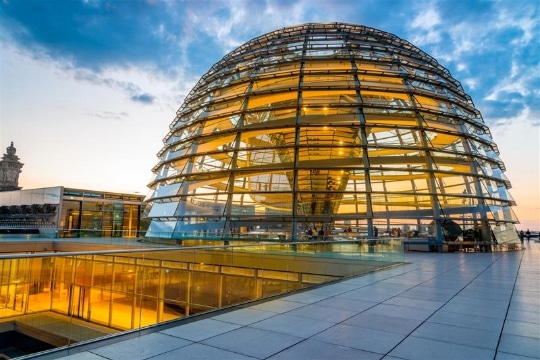What is the outlook for Germany’s economy?
Our economists now see Germany’s economy growing 0.4% in 2025, an increase of 0.1 percentage point from their prior forecast. They expect 1.4% growth in 2026, a 0.2 percentage point increase to the outlook.
They also slightly lowered their forecast for GDP growth in 2027, from 2.0% to 1.8%, because recent developments suggest government spending will be more tilted toward current expenses rather than investment. The spending will be more frontloaded, and there will be “a lower cumulative multiplier,” Garnadt writes.
There are several reasons why the budget and the medium-term fiscal plan will be less oriented toward investment and more toward current spending. First is that actual investment spending in recent years has been substantially below budgeted investment spending. The government has found it difficult to deliver fully on its investment promises in the past, and it only delivered about €75 billion under a €100 billion investment budget last year.
The second reason has to do with federal fund transfers to state governments. “While the transfer to the states is labelled as investment spending in the federal budget, the recent agreement between the states and the government does not require these funds to be used for specific projects or for additional investment,” Garnadt explains. This means the money can replace state-level funds that were budgeted as investment spending, and those funds can be repurposed for current spending.
Higher investment spending in an alternative scenario
In another possible scenario, investment spending might indeed be higher. In this outcome, the fiscal plan is implemented as planned and transfers to the states do, in fact, lead to additional state-level investment, the report notes. This would boost public investment to 0.3% above the GDP baseline the researchers are using for their forecasts.
“This scenario would lead to a steeper increase in the deficit and a more frontloaded fiscal impulse, that on aggregate would also be larger due to the higher share of public investment,” Garnadt writes.
Even without that, the budget draft and fiscal plan “reinforces our expectation for a large fiscal boost,” our researchers find. And this furthers the expectation that an economy that has lagged the rest of Europe for several years is on a faster growth path. Goldman Sachs Research’s growth forecasts for the country are now further above consensus expectations for 2025 and 2026 and meaningfully above the current Bundesbank forecasts.
